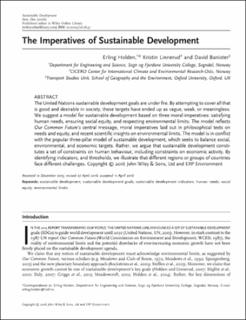The Imperatives of Sustainable Development
| dc.contributor.author | Holden, Erling | |
| dc.contributor.author | Linnerud, Kristin | |
| dc.contributor.author | Banister, David | |
| dc.date.accessioned | 2021-04-30T12:44:43Z | |
| dc.date.available | 2021-04-30T12:44:43Z | |
| dc.date.created | 2016-09-08T11:32:39Z | |
| dc.date.issued | 2017 | |
| dc.identifier.citation | Sustainable Development. 2017, 25 (3), 213-226. | |
| dc.identifier.issn | 0968-0802 | |
| dc.identifier.uri | https://hdl.handle.net/11250/2740623 | |
| dc.description.abstract | The United Nations sustainable development goals are under fire. By attempting to cover all that is good and desirable in society, these targets have ended up as vague and meaningless. We suggest a model for sustainable development based on three moral imperatives: satisfying human needs, ensuring social equity, and respecting environmental limits. The model reflects Our Common Future's central message, moral imperatives laid out in philosophical texts on needs and equity and recent scientific insights on environmental limits. The model is in conflict with the popular three-pillar model of sustainable development, which seeks to balance social, environmental and economic targets. Rather, we argue that sustainable development constitutes a set of constraints on human behavior, including constraints on economic activity. By identifying indicators, and thresholds, we illustrate that different regions or group of countries face different challenges. | |
| dc.language.iso | eng | |
| dc.title | The Imperatives of Sustainable Development | |
| dc.type | Peer reviewed | |
| dc.type | Journal article | |
| dc.description.version | publishedVersion | |
| dc.source.pagenumber | 213-226 | |
| dc.source.volume | 25 | |
| dc.source.journal | Sustainable Development | |
| dc.source.issue | 3 | |
| dc.identifier.doi | 10.1002/sd.1647 | |
| dc.identifier.cristin | 1379254 | |
| dc.relation.project | Norges forskningsråd: 238281 | |
| cristin.unitcode | 7475,0,0,0 | |
| cristin.unitname | CICERO Senter for klimaforskning | |
| cristin.ispublished | true | |
| cristin.fulltext | original | |
| cristin.qualitycode | 2 |
Tilhørende fil(er)
Denne innførselen finnes i følgende samling(er)
-
Journal articles [478]
